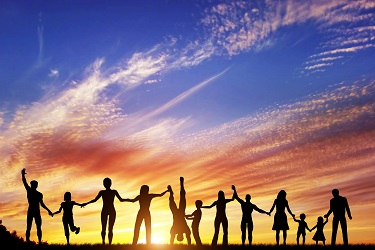The term “family” traditionally means people who are related to you by blood or through marriage. It includes your spouse, kids, parents, siblings, in-laws, aunts, uncles, etc.
It doesn’t matter if these individuals regularly interact with you. They may only know of your existence from infrequent family functions or by seeing your name on the family tree.
Over the years, we’ve expanded the term “family” to include very close friends – people that share life experiences with us. Iconic sitcoms such as The Golden Girls in the ’80s and Friends in the ’90s helped us evolve our definition of “family.”
As our relationships have become complex with divorces, remarriages, and unmarried couples, the term “family” has expanded. The sitcom Modern Family gained its popularity due to mirroring our expanded definition.
In my personal experience, I still consider some individuals “family,” even though I am no longer related by marriage. When you create a bond with someone, divorce shouldn’t dictate whether that relationship ends or continues.
Why does the term “family” matter?
When celebrating significant events, such as a wedding, we often have limits on how many people can be invited. These limits could be in place due to budget restrictions or venue restrictions.
We may have to restrict the guest list to “family” only. This restriction leads to the question, do you use the traditional definition of “family,” or do you extend the term?
We are forced to categorize relationships. We have to determine who is important while balancing family obligations. For example, you may not like your mom’s sister, but you are obligated to invite her.
When thinking about who is part of your family, think about if they will be present in your life down the road. Will you have shared experiences with them beyond social media likes?
When you’re younger, friends may seem like family because you’re sharing many experiences with them. But as life becomes more complex, how many of those friends will remain active in your life?
With social distancing, many spring celebrations have been rescheduled. With limits on how many can attend a gathering, some of us are forced to reduce further the guest list. At least with this restriction, it’s easier to exclude some people without feeling guilty.
Keeping the guest list to “family” only is complex in today’s world. Sometimes it’s easier to have no event – probably the reason some couples decide to elope.
If we continue to have social distancing restrictions, the size of our gatherings will remain small. Some may opt to have multiple smaller events and segment the guest list into groups.
Instead of having 100 people at one event, you may have 5 smaller events with 20 guests. At least in this scenario, you can spend quality time with each group… and if you’re a bride, you can wear your wedding gown multiple times.
No matter the situation, let those you cherish know you consider them “family.”
ABOUT THE AUTHOR:
 Niv Persaud, CFP®, CDFA™, RICP®, CRPC®, is the Founder of Transition Planning & Guidance, LLC. Life is more than money. It’s about living the lifestyle you want and can afford. For that reason, Niv consults with clients on money, life, and work. Her approach capitalizes on techniques she learned throughout her career, including as a management consultant, executive recruiter, and financial advisor. Her services include developing spending plans, comprehensive financial plans, divorce financial reviews, retirement plans. Niv actively gives back to her community through her volunteer efforts. She believes in living life to the fullest by cherishing friendships, enjoying the beauty of nature and laughing often — even at herself. Her favorite quote is by Erma Bombeck, “When I stand before God at the end of my life, I would hope that I would not have a single bit of talent left and could say ‘I used everything you gave me.’”
Niv Persaud, CFP®, CDFA™, RICP®, CRPC®, is the Founder of Transition Planning & Guidance, LLC. Life is more than money. It’s about living the lifestyle you want and can afford. For that reason, Niv consults with clients on money, life, and work. Her approach capitalizes on techniques she learned throughout her career, including as a management consultant, executive recruiter, and financial advisor. Her services include developing spending plans, comprehensive financial plans, divorce financial reviews, retirement plans. Niv actively gives back to her community through her volunteer efforts. She believes in living life to the fullest by cherishing friendships, enjoying the beauty of nature and laughing often — even at herself. Her favorite quote is by Erma Bombeck, “When I stand before God at the end of my life, I would hope that I would not have a single bit of talent left and could say ‘I used everything you gave me.’”
More “Personal Relationships” Posts:
Talk Less And Listen More When Calling Your Aging Parents
How Social Distancing Is Bringing Us Together
Your Divorce Also Impacts Your Friends

